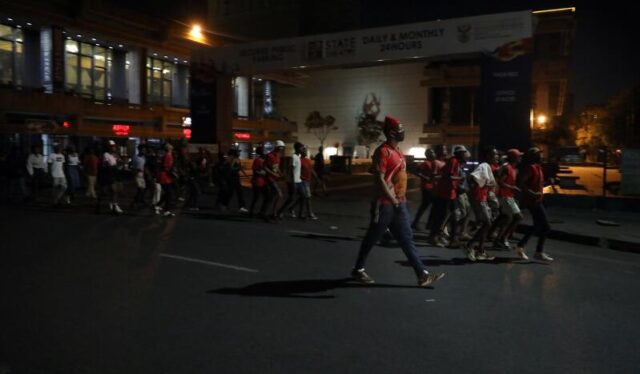OPINION: We can be thankful that the national shutdown proceeded peacefully on March 20, but until there are urgent changes in policing, we have no guarantee that future protests by different political players and criminal syndicates will offer the same protection, writes Mary de Haas.
By Mary de Haas
THE ANNOUNCEMENT of a country-wide shutdown by the EFF on March 20 was widely viewed with apprehension, not only for its economic consequences but because it fuelled fears of a recurrence of the mayhem of July 2021.
The State Security cluster provided assurances that their planning would ensure that law and order was maintained and, amid police deployment, backed by a display of private security might, the shutdown proceeded without major incidents. In this instance, the SAPS did what was constitutionally required of it, for, without a significant security force presence, it is highly probable that intimidation, violence, and looting would have occurred.
However, as protest continues away from the public spotlight, long-standing problems in policing will not disappear until the major changes advocated by policing experts are implemented.
Despite images from July 2021 springing to mind when the EFF planned shutdown was announced, the comparison is superficial: In 2021, the government lacked the political will to prevent it spiralling out of control by deploying the army as soon as the national highways were blocked. It is a different matter altogether to send a message to political adversaries who protest.
The day before the shutdown started, a man wearing an EFF T-shirt was allegedly severely beaten by police in Heidelberg (Free State). Protest action, most of which is about lack of service delivery, takes many forms, and is often badly policed. Also on the eve of the shutdown, video footage showed police abusing protesting students in Braamfontein and firing indiscriminately at a building. During the Fees Must Fall protest in Johannesburg in 2016, some students had been very badly injured when shot with rubber bullets.
Police brutality is endemic, as evidenced by high rates of abuse and torture and many dozens of deaths in police custody annually. It often accompanies protest policing and may contribute to an escalation of its violence.
Following the post-Marikana Farlam Commission findings, an Inquiry was held into policing and crowd management during protest action. Its May 2018 report provided valuable, detailed guidelines about the imperative changes needed in policing generally, with a specific focus on crowd management. It should be based on ethical, constitutionally compliant guidelines and professionalism, accountability and transparency. Appointments had to be competence-based – the possession of the requisite skills and experience for a position.
To achieve these ends, an independent Police Board should be established to oversee staffing matters, accompanied by the de-militarisation of the police (as envisaged by the authors of the Constitution and the National Development Plan).
This report details what is required to manage crowds and protests while preventing violence or its escalation and protecting police members. Training should be in terms of international best practices and, wherever possible, less lethal weapons, such as water canons, should be used, with teargas preferable to the firing of rubber bullets, which can cause serious injuries. It was also essential to ensure that Public Order Policing (and other operational units) had sufficient members.
Three years after that report was handed to the Minister, it became painfully obvious, post July 2021, that none of these recommendations about restructuring, training, and equipment – including tankers and stun grenades -had been implemented. The Presidentially-appointed Expert Panel investigating the July 2021 anarchy made shocking findings about the state of Public Order Policing. Instead of the 12,779 members required for adequate performance, POP then had only 5,502 members. There was only one water cannon per province, and there was no airwing capacity (both of these widely used in the past). What equipment there was had not been maintained.
eThekwini residents will recall that millions had been spent by the municipality to procure four Casspirs, supposedly to back up the SAPS in protest action. They were nowhere in evidence in the worst of the looting areas in 2021. According to unconfirmed reports, they, too, had not been maintained and had been sold to pay Metro Police debt.
Since constitutionally-mandated transparency and accountability in policing is lacking, it is impossible for a researcher to obtain accurate information about what changes, if any, have been implemented in POP since 2021. It is, however, obvious that, despite the findings of the Zondo Commission about SAPS Crime Intelligence – which is tasked with gathering information about planned disruptions to allow proactive policing – has lurched from bad to worse, with grossly irregular appointments, since 2021.
Since there is no political will to deal with our policing crisis, all voters need to challenge their public representatives to get questions answered and demand that the Zondo Commission recommendations, and those of the Policing Experts 2018 report be actioned.
We can be thankful that the shutdown proceeded peacefully on 20 March, but until there are urgent changes in policing, we have no guarantee that future protests by different political players and criminal syndicates will offer the same protection.
* Mary de Haas is a political and human rights activist and a violence monitor.
** The views expressed here do not necessarily reflect the views of the DFA.








